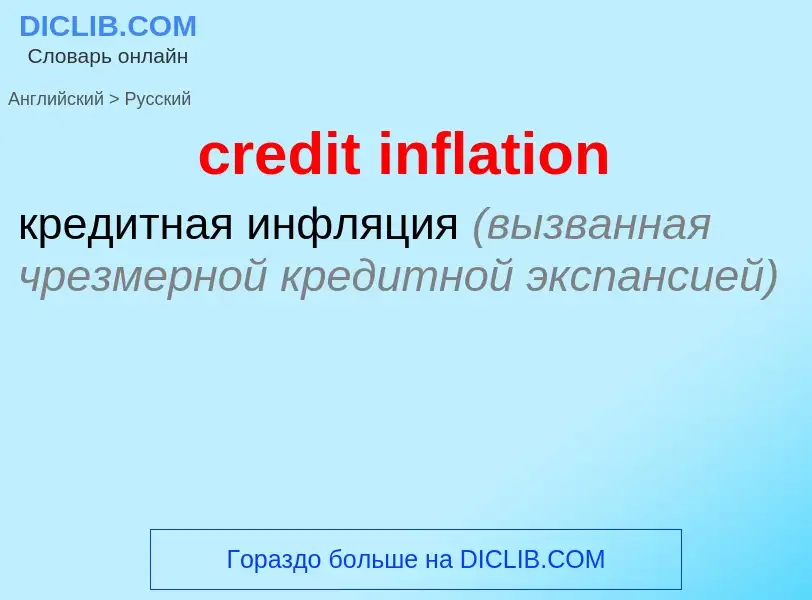Перевод и анализ слов искусственным интеллектом ChatGPT
На этой странице Вы можете получить подробный анализ слова или словосочетания, произведенный с помощью лучшей на сегодняшний день технологии искусственного интеллекта:
- как употребляется слово
- частота употребления
- используется оно чаще в устной или письменной речи
- варианты перевода слова
- примеры употребления (несколько фраз с переводом)
- этимология
credit inflation - перевод на русский
[kri'denʃ(ə)liz(ə)m]
существительное
неодобрительное выражение
оценка (работника) по документам
дипломам и т. п. (обыкн. при приёме на работу)
существительное
банковское дело
кредитование
выдача кредита [ссуды]
выделение кредита
Смотрите также
2) доверие
3) кредит, правая сторона счёта || записывать на кредит
4) сумма, записанная на приход
5) аккредитив
6) льгота, скидка
- credit against goods
- credit at the bank
- credit by way of guarantee
- debit and credit
- for the credit of one's account
- credit is shaken
- on credit
- credit on goods
- credit on mortgage
- credit on property
- credit on real estate
- credit partially drawn down
- credit an amount to someone
- buy on credit
- call in a credit
- cancel a credit
- give credit
- obtain credit
- run out of credit
- sell on credit
- acceptance credit
- accommodation credit
- anticipatory credit
- back-to-back credit
- blank credit
- book credit
- campaign credit
- capital market credit
- cash credit
- clean credit
- collateral credit
- commercial credit
- commercial documentary credit
- confirmed credit
- consumer credit
- current account credit
- deferred credit
- discount credit
- dividend credit
- documentary credit
- draft credit
- drawing credit
- earned income credits
- evergreen credit
- exhausted credit
- extended credit
- external credit
- Federal Reserve credit
- frozen credit
- general purpose credit
- immediate credit
- impaired credit
- installment credit
- interim credit
- investment credit
- investment tax credit
- irrevocable credit
- long credit
- low-interest credit
- margin credit
- noninstallment credit
- open account credit
- packing credit
- paid credit
- paper credit
- personal credit
- public credit
- reimbursement credit
- retail credit
- retirement income credit
- revocable credit
- revolving credit
- roll-over credit
- rural credit
- secondary credit
- self-liquidating credit
- short credit
- sight credit
- standby credit
- starting credit
- sterling credit
- store credit
- syndicated bank credit
- tax credit
- temporary credit
- tied credit
- trade credit
- uncollectible credit
- unlimited credit
- unsecured credit
- untied credit
Определение
Википедия
Monetary inflation is a sustained increase in the money supply of a country (or currency area). Depending on many factors, especially public expectations, the fundamental state and development of the economy, and the transmission mechanism, it is likely to result in price inflation, which is usually just called "inflation", which is a rise in the general level of prices of goods and services.
There is general agreement among economists that there is a causal relationship between monetary inflation and price inflation. But there is neither a common view about the exact theoretical mechanisms and relationships, nor about how to accurately measure it. This relationship is also constantly changing, within a larger complex economic system. So there is a great deal of debate on the issues involved, such as how to measure the monetary base and price inflation, how to measure the effect of public expectations, how to judge the effect of financial innovations on the transmission mechanisms, and how much factors like the velocity of money affect the relationship. Thus, there are different views on what could be the best targets and tools in monetary policy.
However, there is a general consensus on the importance and responsibility of central banks and monetary authorities in setting public expectations of price inflation and in trying to control it.
- Keynesian economists believe the central bank can sufficiently assess the detailed economic variables and circumstances in real time to adjust monetary policy in order to stabilize gross domestic product. These economists favor monetary policies that attempt to even out the ups and downs of business cycles and economic shocks in a precise fashion.
- Followers of the monetarist school think that Keynesian style monetary policies produce many overshooting, time-lag errors and other unwanted effects, usually making things even worse. They doubt the central bank's capacity to analyse economic problems in real time and its ability to influence the economy with correct timing and the right monetary policy measures. So monetarists advocate a less intrusive and less complex monetary policy, specifically a constant growth rate of the money supply.
- Some followers of Austrian School economics see monetary inflation as "inflation" and advocate either the return to free markets in money, called free banking, or a 100% gold standard and the abolition of central banks to control this problem.
Currently, most central banks follow a monetarist or Keynesian approach, or more often a mix of both. There is a trend of central banks towards the use of inflation targeting.


